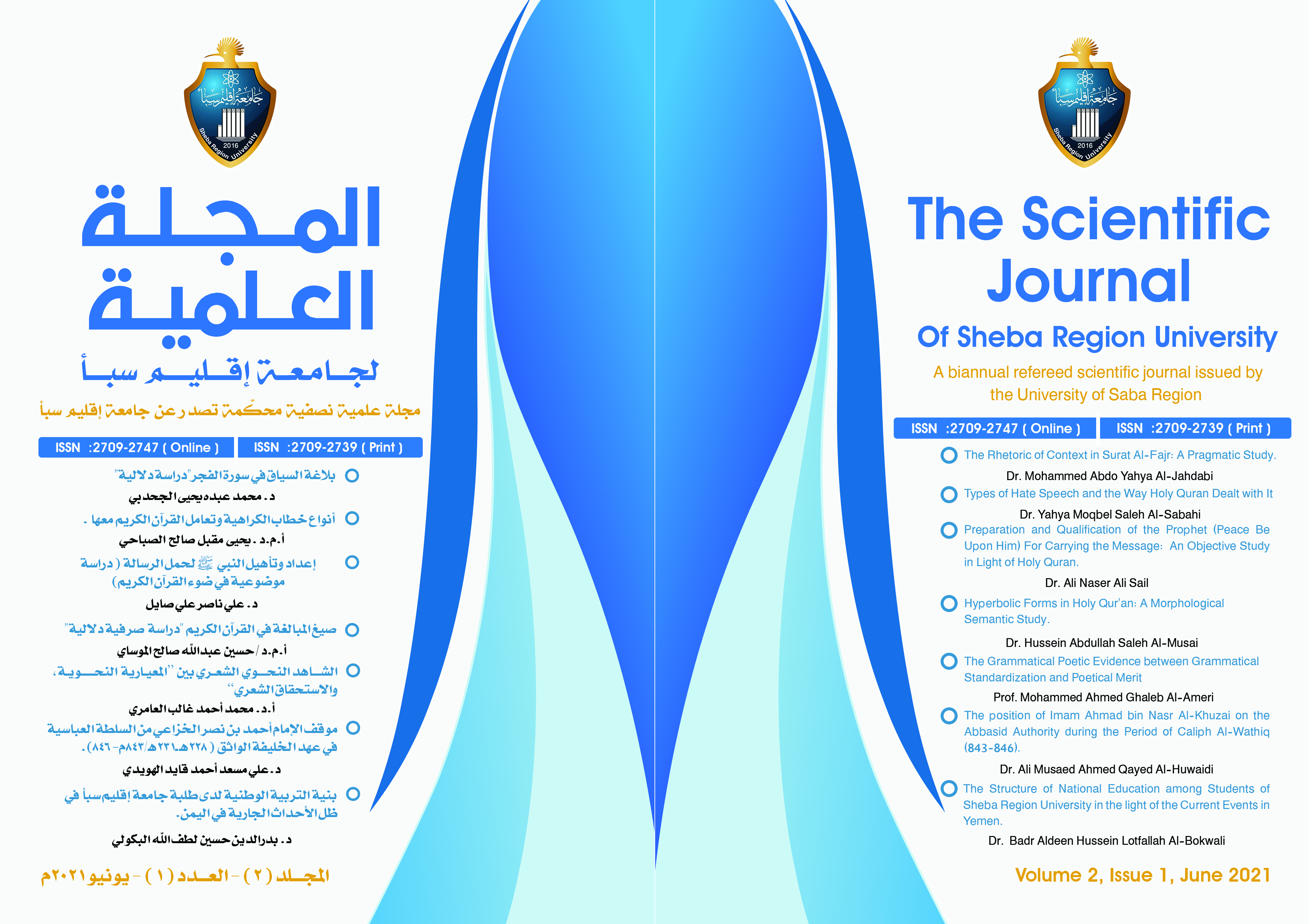أنواع خطاب الكراهية وتعامل القرآن الكريم معها
Types of Hate Speech and the Way Holy Quran Dealt with It Dr. Yahya Moqbel Saleh Al-Sabahi
الكلمات المفتاحية:
خطاب، الكراهية، العرق، المعتقد، speech، hate، race، beliefالملخص
يبحث الموضوع عن أنواع خطاب الكراهية وتعامل القرآن الكريم معها، ويعالج إشكالية ظهور خطاب الكراهية بشكل لافت في أوساط المجتمعات، وما ترتَّب على ذلك من الصراع بين الأعراق المتنوعة ،واتهام الإسلام من قبل عنصريين بتأجيج الكراهية وتعميق الصراع بين الأمم، ويهدف البحث إلى بيان منطلقات خطاب الكراهية وكيفية تعامل القرآن الكريم معها . و يقوم البحث على المنهج الاستقرائي من خلال استقراء الآيات التي تحدَّثت عن علاقة الإنسان بغيره من الناس خصوصا المُختَلف معهم ، ثم من خلال منهج الاستنباط لمعرفة أسباب العداوات وظهور أنواع خطاب الكراهية بينهم ، وكذا استنباط طرق التعامل مع هذه الأنواع من خلال الآيات التي تحدَّثت عن خلق الإنسان وعلاقته بغيره.
وقد توصل البحث إلى أنَّ أنواع خطاب الكراهية تنبع من دوافع عرقية أو عقديةٍ أو بناءً على أحكام مسبقةٍ، و يتنوع خطاب الكراهية بتنوع الدافع الذي انطلق منه، و من آثار خطاب الكراهية إغلاق أبواب الحوار والتفاهم، وتعميق الانقسام بين المجتمعات. و تعامل القرآن الكريم مع هذا الخطاب من خلال فتح باب الحوار والنقاش مع المخالف وكذا الدعوة إلى التعاون، وأوصى البحث بإقامة الندوات، والمؤتمرات المفتوحة التي تعنى بتنمية النقاش والحوار والتدريب عليه. و تعويد النشء ابتداء من المدارس الابتدائية على تقبل الآخر، وحسن الخطاب مع المخالف، وعدم احتقار الآراء من خلال مناهج دراسية نظرية وعملية مصاحبة .
Abstract:
The study examines the types of hate speech and how Holy Quran has dealt with them. It also addresses the issue of the noticeable emergence of hate speech among societies, and the consequent conflict among the various races. In addition, the study discusses the racial accusation against Islam of fueling hatred and deepening the conflict between nations. The aim of the study is to clarify the premises of hate speech and how Holy Quran deals with them. The researcher uses the inductive approach to investigate the ayat (verses) of Holy Quran that have talked about a person’s relationship with other people, especially those who disagree with him/her. The researcher uses the deductive approach to find out the causes of hostilities and the types of hate speech among people, and to formulate ways to deal with these types from the ayat that have talked about the creation of mankind and their relationship with others. The study concludes that the types of hate speech arise from racial or ideological motives or collective prejudices and that hate speech varies with the diversity of the motive. One of the effects of hate speech is that it hampers dialogue and understanding. It deepens the division between societies as well. The research recommends holding seminars and open conferences that are concerned with developing and training people for discussion and dialogue. The research also recommends accustoming young people to accepting others, speaking well with the ones they disagree with, and respecting opinions of others. This should start from primary schools and through accompanying theoretical and practical curricula
التنزيلات
منشور
كيفية الاقتباس
إصدار
القسم
الرخصة
حقوق النشر والترخيص
تنشر هذه المجلة جميع المواد العلمية بموجب رخصة Creative Commons Attribution 4.0 International (CC BY 4.0) ، والتي تمنحك الصلاحيات التالية:
لك مطلق الحرية في:
- المشاركة — نسخ وتوزيع ونقل العمل لأي وسط أو شكل. لأي غرض، بما في ذلك تجارياً.
- التعديل — المزج، التحويل، والإضافة على العمل. لأي غرض، بما في ذلك تجارياً.
- لا يمكن للمرخِّص إلغاء هذه الصلاحيات طالما اتبعت شروط الرخصة.
بموجب الشروط التالية:
- نَسب المُصنَّف — يجب عليك نَسب العمل لصاحبه بطريقة مناسبة ، وتوفير رابط للترخيص، وبيان إذا ما قد أُجريت أي تعديلات على العمل . يمكنك القيام بهذا بأي طريقة مناسبة، ولكن على ألا يتم ذلك بطريقة توحي بأن المؤلف أو المرخِّص مؤيد لك أو لعملك.
- منع القيود الإضافية — يجب عليك ألا تطبق أي شروط قانونية أو تدابير تكنولوجية تقيد الآخرين من ممارسة الصلاحيات التي تسمح بها الرخصة.
ملاحظات:
لا يتوجب عليك الامتثال لشروط الرخصة مع العناصر الخاضعة للملك العام في المصنف أو إذا كان استخدامك ضمن نطاق الاستثناءات أو الصلاحيات .
بدون ضمانات. قد لا توفر لك الرخصة كل الصلاحيات التي تحتاجها لغرض معين. فمثلاً، الحقوق الأخرى مثل الشهرة، الخصوصية، أو الحقوق المعنوية قد تحد من استخدامك المُصنَّف.











